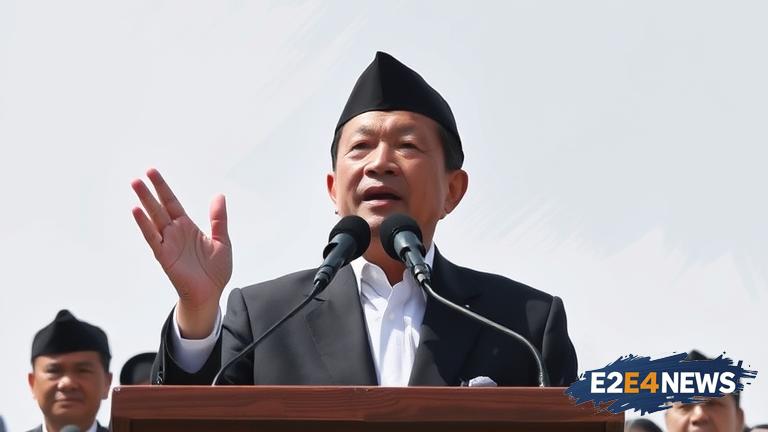Prabowo Subianto, the Indonesian presidential candidate, has been under fire for his recent comments in which he referred to dissenting voices as ‘foreign stooges’. The remarks, made during a speech, have sparked widespread criticism and outrage, with many accusing Prabowo of attempting to silence opposition and undermine democratic values. The comments have been seen as a thinly veiled attack on those who disagree with his policies and vision for the country. Prabowo’s supporters have defended the remarks, claiming that they were taken out of context and that the candidate was simply trying to highlight the importance of national sovereignty. However, critics argue that the comments are part of a larger pattern of behavior by Prabowo, who has a history of making divisive and inflammatory statements. The controversy has highlighted the deepening polarization in Indonesian politics, with many fearing that the country’s democratic institutions are under threat. The remarks have also sparked concerns about the potential for violence and intimidation against opposition groups and individuals who speak out against Prabowo’s policies. Human rights groups have condemned the comments, saying that they create a chilling effect on free speech and undermine the principles of democracy. The Indonesian government has also weighed in on the controversy, with officials calling for calm and urging Prabowo to clarify his remarks. Despite the backlash, Prabowo has refused to apologize or retract his comments, instead doubling down on his stance. The controversy has significant implications for the upcoming presidential election, with many wondering how Prabowo’s comments will impact his chances of winning. The incident has also sparked a wider debate about the role of foreign influence in Indonesian politics, with some arguing that Prabowo’s comments are a desperate attempt to distract from his own lack of vision and policy. Others have pointed out that the comments are a classic example of a populist tactic, designed to whip up nationalist sentiment and create a sense of Us vs. Them. The controversy has also highlighted the importance of a free and independent media in holding those in power accountable and providing a platform for dissenting voices. In recent years, Indonesia has made significant progress in consolidating its democratic institutions, but the controversy surrounding Prabowo’s comments has raised concerns about the potential for backsliding. The country’s democratic values are enshrined in its constitution, which guarantees freedom of speech and assembly. However, the comments have sparked fears that these values are under threat, particularly if Prabowo were to win the presidency. The international community has also taken notice of the controversy, with many expressing concern about the potential implications for regional stability and security. The United States, in particular, has a significant interest in Indonesia’s democratic development, given the country’s strategic location and importance as a regional player. The controversy has also sparked a wider debate about the role of social media in Indonesian politics, with some arguing that platforms like Twitter and Facebook have amplified Prabowo’s comments and contributed to the spread of misinformation. Others have pointed out that social media has also provided a platform for dissenting voices to speak out and organize against Prabowo’s policies. As the controversy continues to unfold, many are watching with bated breath to see how the situation will play out. The upcoming presidential election is widely seen as a critical test of Indonesia’s democratic institutions, and the controversy surrounding Prabowo’s comments has raised the stakes. The country’s voters will ultimately decide the outcome, but the controversy has highlighted the importance of a free and fair election process. In the meantime, human rights groups and civil society organizations are calling for calm and urging all parties to respect the principles of democracy and human rights. The Indonesian government has also pledged to ensure that the election is conducted in a fair and transparent manner, with international observers invited to monitor the process. As the situation continues to evolve, one thing is clear: the controversy surrounding Prabowo’s comments has significant implications for Indonesia’s democratic development and the future of the country.
